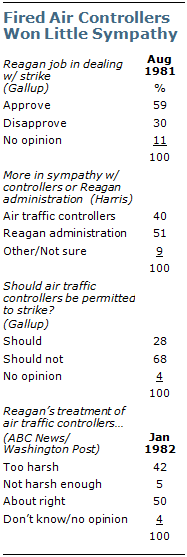The bitter fight over union rights in Wisconsin calls to mind a labor battle that helped define the first year of Ronald Reagan’s presidency. Thirty years ago in August, Reagan fired more than 11,000 air traffic controllers after they staged a strike against the federal government.
 Reagan’s reaction to the PATCO (Professional Air Traffic Controllers Organization) strike was widely portrayed as harsh — not only did Reagan fire the controllers, he banned the government from ever rehiring them. The “ban for life” was rescinded by the Clinton administration, but not until 12 years after the strike.
Reagan’s reaction to the PATCO (Professional Air Traffic Controllers Organization) strike was widely portrayed as harsh — not only did Reagan fire the controllers, he banned the government from ever rehiring them. The “ban for life” was rescinded by the Clinton administration, but not until 12 years after the strike.
But the public solidly supported Reagan’s action. Fully 59% of Americans approved of the way he was handling the issue, according to a Gallup poll conducted a few days after he fired the controllers. A Harris survey at about the same time showed that by 51% to 40%, more said they were in sympathy with the Reagan administration than with the air traffic controllers. Several months later, in January 1982, 50% said that Reagan’s treatment of the air traffic controllers was “about right.”
In many ways, the public’s reaction was predictable. While labor unions had much more support in the early 1980s than they do today, Americans clearly drew the line against strikes by government workers in essential occupations — including air traffic controllers. In the Gallup poll, just 28% said air traffic controllers should be permitted to strike while 68% said they should not. Even among those in households with a union member, just 40% said the controllers should be allowed to strike.
This underscores one of the many differences between the long-ago strike by PATCO and today’s fight between public employee unions and the Wisconsin state government. Notably, PATCO launched its strike to win major concessions from the federal government in wages and benefits. Government workers in Wisconsin have agreed to Republican Gov. Scott Walker’s proposed benefit cuts, but are protesting merely to maintain their right to collective bargaining — which would be curtailed under the proposed legislation.
Organized labor is in a much weaker position today than it was during the air traffic controllers’ strike. A recent Pew Research survey found that favorability of labor unions is at one of its lowest levels since 1985. Gallup’s seven-decade track on public approval of labor unions has found a similar trend.
Moreover, the Wisconsin dispute is coming at a time when financially stressed state governments are seeking to roll back the benefits of state government workers. The Pew Research poll found that only about half (47%) favor decreasing pensions for government workers to balance their state’s budget. Yet that option is much more palatable than either cuts in program funding or increased taxes.
Even so, it is not clear whether the public nationally will support Wisconsin Republicans’ efforts to prevent government workers from unionizing. In the Pew Research survey, which was conducted before the Wisconsin protests drew national headlines, people were asked for their reaction when they hear of a disagreement between a labor union and a state or local government: 44% say that when they hear of such a dispute they side with the unions while 38% say they side with the governments.


